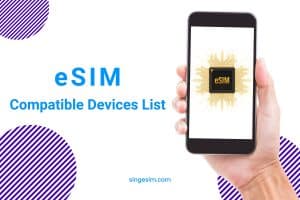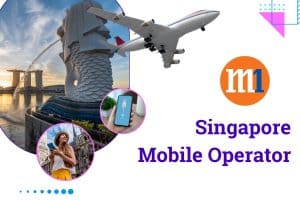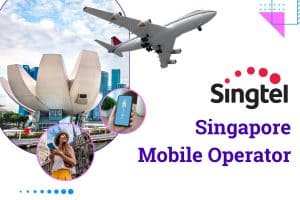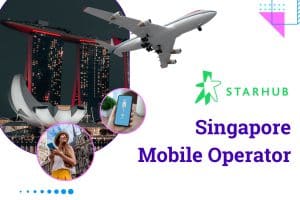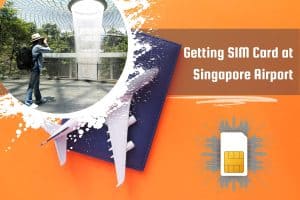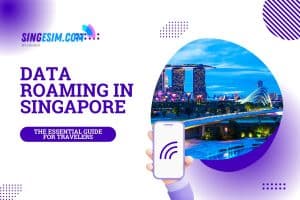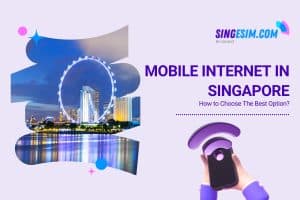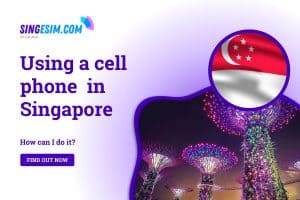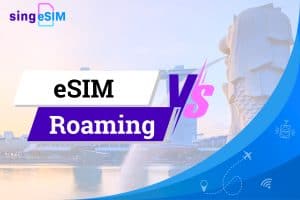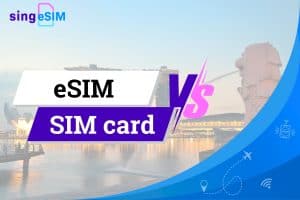Singapore is a country that is well known for its modern and efficient infrastructure, including its telecommunications network. As a traveler to Singapore, having a reliable and fast mobile connection is essential to stay connected with loved ones, access important information, and navigate the city-state. With several mobile operators, it can be challenging to determine which provider to opt for. In this article, we will explore the top mobile operators in Singapore, providing you with the information you need to decide on the best provider to meet your mobile communication needs during your visit to Singapore.
This guide will walk you through the overview of top mobile operators in Singapore, including:
Now, let’s start!
Table of Contents
I. Do I Need a SIM Card from Singapore Mobile Operators When Travelling to Singapore?

Buying a SIM card when traveling to Singapore is generally a good idea, but it is not strictly required. Here are some things to consider:
- Do you need a local Singapore mobile number? If you need basic connectivity and data access, using your regular mobile data on roaming is often sufficient and may be cheaper than buying a local SIM card. However, roaming rates can still be high and may face data limits.
- Do you need calls and texts? If most of your calls will be to local Singapore numbers, getting a local SIM card is best so you can call at local rates. Outgoing calls and texts to Singapore numbers on roaming may incur high charges.
- Data access: If you need reliable 4G LTE data access in Singapore, a local SIM card will usually give you faster, more affordable access. Data roaming rates can be expensive.
- Customer service: Using a local SIM card from Singapore mobile operators allows you to access Singapore-based customer service support, which is usually more responsive and helpful when traveling.
- Emergency calls: For emergency calls in Singapore, a local SIM card will allow you to call emergency services at no cost. Roaming emergency calls typically incur high charges.
So, buying an inexpensive local SIM card when traveling to Singapore is advisable, especially if you plan to make a lot of calls or need reliable data access.
Note:
- Several mobile network operators in Singapore, including Singtel, StarHub, and M1, offer prepaid SIM cards for tourists.
- SIM cards can be purchased at the airport, mobile network operator stores, or convenience stores.
- Before purchasing a SIM card, ensure your device is compatible with the network frequencies used in Singapore and that your device is unlocked for international use.
II. How Many Mobile Operators in Singapore?
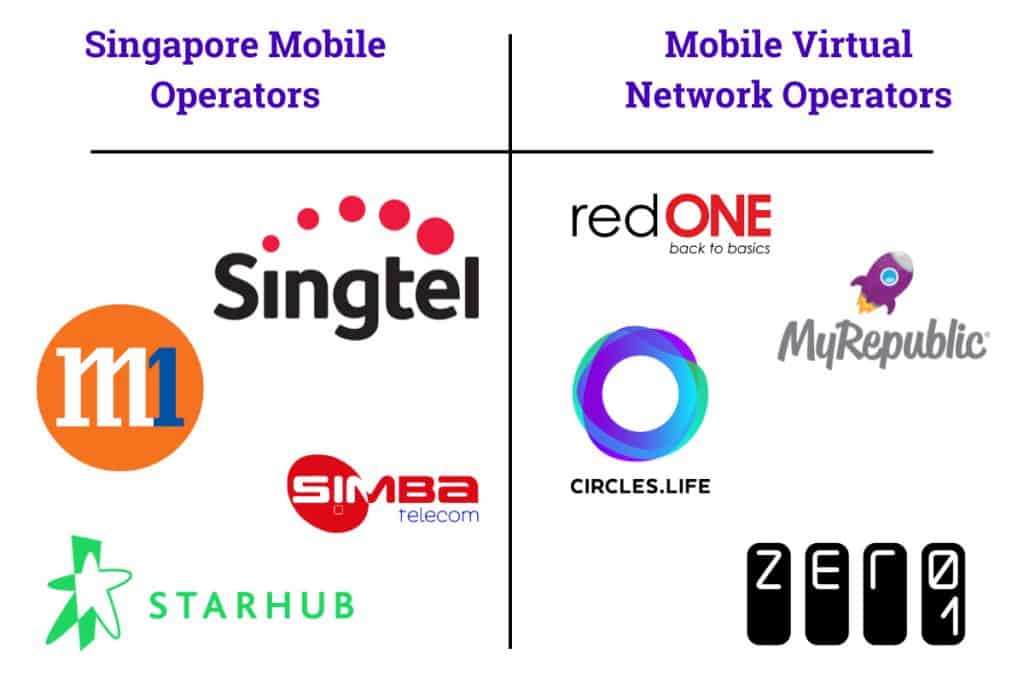
Singapore has two main types of mobile operators: full-service mobile network operators (MNOs) and mobile virtual network operators (MVNOs).
Full-service MNOs own and operate their own mobile network infrastructure, which includes cell towers, base stations, and other hardware required for mobile communications.
MVNOs, on the other hand, do not own their own network infrastructure but instead lease network capacity from full-service MNOs. MVNOs typically offer more specialized services, such as low-cost plans or plans catering to specific market segments.
1. Main Mobile Operators in Singapore
There are currently three main mobile operators in Singapore:
These three companies provide extensive coverage across Singapore, offering various mobile services, including voice, data, and messaging.
1.1. Singtel
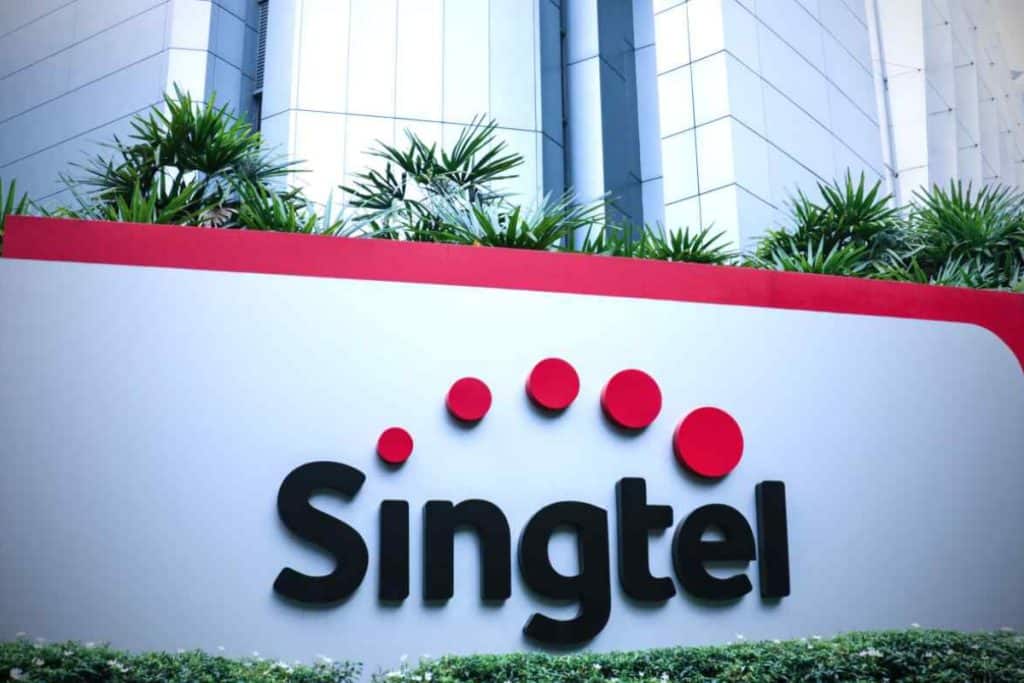
Singtel is one of the largest and most established mobile operators in Singapore. The company was founded in 1879 and has become a leading telecommunications provider in the Asia-Pacific region.
Singtel operates its own network infrastructure and provides a wide range of mobile services to consumers in Singapore, including voice, data, and messaging. The company’s extensive network coverage and reliable service have made it popular among locals and visitors.
In addition to its mobile services, Singtel offers various other telecommunications services, including fixed-line services, broadband internet, and digital television.
1.2. M1
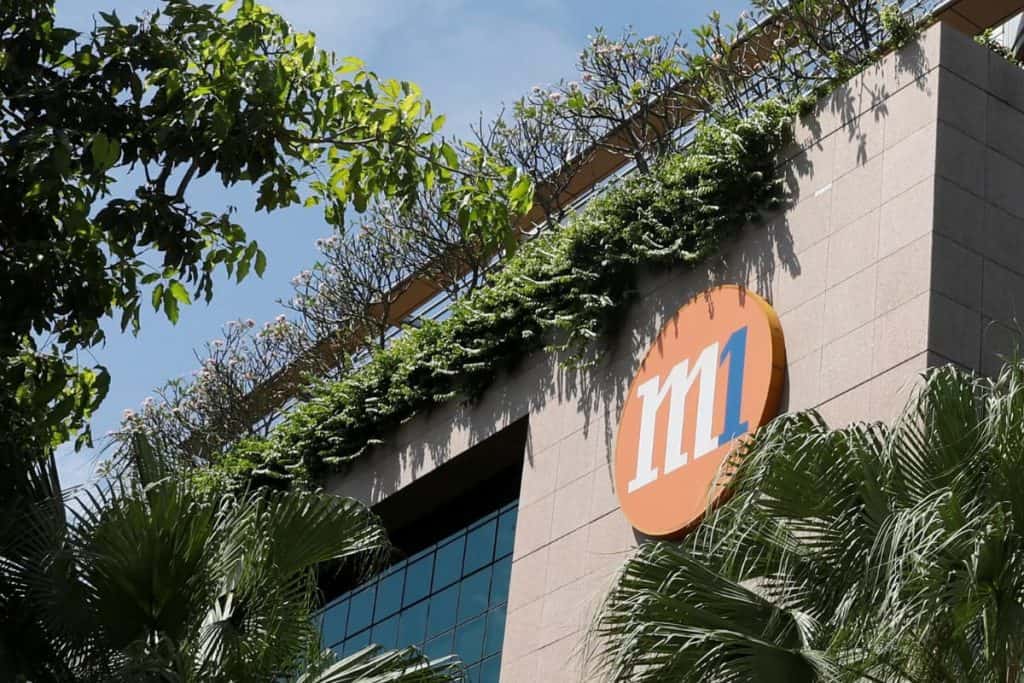
M1 Singapore is a mobile operator in Singapore that was established in 1997. The company operates its own network infrastructure and offers a range of mobile services, including voice, data, and messaging.
With a focus on innovation, M1 has been at the forefront of introducing new mobile technologies and services in Singapore. The company has also been recognized for its excellent customer service and reliable network coverage, making it a popular choice for locals and visitors.
1.3. StarHub
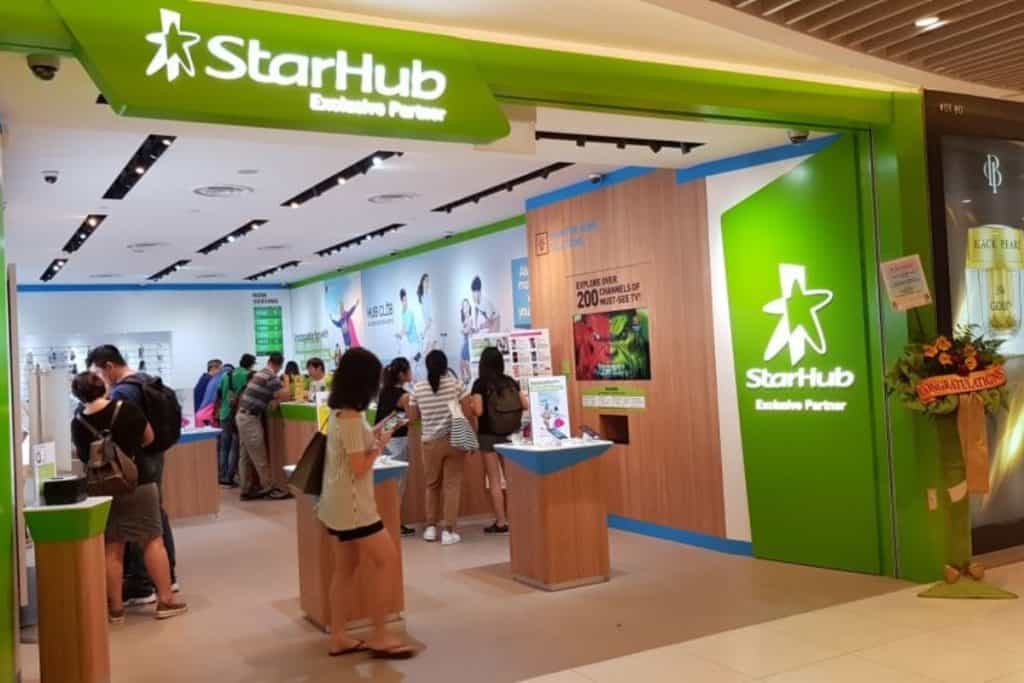
StarHub is one of the top mobile operators in Singapore, providing a wide range of mobile services to consumers since its inception in 2000. As a full-service mobile network operator, StarHub operates its own network infrastructure and offers voice, data, and messaging services to customers across the island.
The company has been recognized for its innovative mobile solutions, such as its mobile TV service, which allows customers to watch their favorite TV shows on the go. With a focus on delivering quality service and innovative solutions, StarHub has become a popular choice for locals and Singapore visitors.
In addition to its mobile services, the company also offers broadband internet, cable TV, and other telecommunications services. This introduction sets the stage for a deeper exploration of StarHub’s mobile services, network coverage, and impact on Singapore’s telecommunications landscape.
1.4. SIMBA Telecom
SIMBA Telecom Pte Ltd is a major telecommunications company in Singapore. Established in 2016 by Australian businessman David Teoh, it was formerly known as TPG Singapore and was a subsidiary of TPG Telecom Australia. SIMBA Telecom won an auction from IMDA for its airwaves rights and has since provided a range of mobile services to consumers in Singapore.
In 2020, TPG Australia merged with Vodafone, separating TPG Singapore from its Australian counterpart. It operates under the newly established Tuas Ltd, listed in Australia and independently of the merged TPG Telecom entity. In 2022, TPG Singapore rebranded as SIMBA Telecom after the usage rights to TPG expired.
2. Top Mobile Virtual Network Operators (MVNO)
In addition to these three major players, several Mobile Virtual Network Operators (MVNOs) in Singapore operate on the networks of the main operators. These MVNOs typically offer specialized services, such as low-cost plans or plans catering to specific market segments.
2.1. Zero1 (on Singtel’s network)
Zero1 Pte Ltd was founded in 2017 as a Mobile Virtual Network Operator (MVNO) licensed by the Info-communications Media Development Authority of Singapore. Zero1 aims to provide affordable yet compelling mobile service for Singapore consumers through innovative digital solutions and partnership models.
Zero1 does not own its own network infrastructure. Instead, it partners with leading networks in Singapore to provide nationwide coverage and fast data speeds. By leveraging partnerships rather than building its own network, Zero1 can offer very affordable rates for mobile service. Subscribers get to enjoy the benefits of top networks at budget-friendly prices.
2.2. Circles.Life (on M1’s network)
Circles.Life is Singapore’s multinational mobile virtual network operator (MVNO). The business was established in 2016 and initially focused solely on Singapore, renting its network from M1.
Liberty Wireless was the first MVNO operating as Circles Asia in Singapore to provide a full-service mobile network experience, which inked a contract with M1 Limited in July 2015 to access M1’s mobile network. It has since grown in Australia and Taiwan, where it rents the Chunghwa Telecom and Optus networks.
2.3. MyRepublic (on StarHub’s network)
MyRepublic Group Limited is a Singaporean communications services provider and is the world’s first telecommunications company powered by a proprietary cloud platform. Launched in 2011, MyRepublic operates in the Asia-Pacific region, with operations in Singapore, Australia, and New Zealand. MyRepublic also licenses its platform to operators in Brunei and Indonesia.
2.4. redONE (on StarHub’s network)
redONE is a mobile virtual network operator (MVNO) that operates on the network of M1, one of Singapore’s main full-service mobile network operators. Established in 2019, redONE offers a range of affordable mobile services to consumers in Singapore, focusing on low-cost plans and value-added services.
As an MVNO, redONE does not own its own network infrastructure but instead leases capacity from M1, allowing it to offer mobile services to its customers at competitive rates.
Tips: Each of these operators offers unique advantages and disadvantages, and it is important to carefully evaluate their services and coverage areas before deciding which one to use.
III. How to Choose the Best Mobile Operators in Singapore?

Here are some tips for choosing the best mobile operators in Singapore:
Determine your needs: Identify how you use mobile services like calling, texting, data, international usage, etc. Choose operators that provide the most suitable plans and benefits for your needs.
Compare coverage: While coverage is generally good in Singapore, it can still vary between operators, especially in newer housing estates or rural areas. Check operator coverage maps or ask friends for their experience.
Consider network quality: If you are concerned about network quality for tasks like streaming HD video, online gaming, or using business applications, compare network performance from independent tests. Generally, Singtel and StarHub tend to rank higher but networks continue improving.
Evaluate plan options: Compare available plans, perks, data limits, and call and text allowances between operators. See who offers the best value and plans that meet your needs without fees for going over limits.
Review total cost of ownership: While base plans may seem affordable, total cost includes fees for going over limits, premium services, phone subsidies, or early termination charges. Try to estimate the total annual cost for different operators.
Check freebies and discounts: Look for operators frequently offering attractive freebies such as Spotify Premium, Netflix subscription, mobile hotspot data, or device discounts/subsidies, especially when you sign up or renew your service.
Consider bundling benefits: Many operators provide bigger data, calling, or cost benefits when you bundle mobile with home services like broadband, TV, home phone, or insurance. See if bundling could reduce your overall spending.
Factor in customer experience: While hard to quantify, customer experience includes billing clarity, support availability/quality, and responsiveness to issues or feedback. Search online reviews or ask friends for their experience with different operators.
Switching between networks is easy: Don’t lock yourself into an operator if you are unhappy with coverage, speed, plan value, experience, or other factors. You can easily switch between networks in Singapore with minimal fees or inconvenience.
IV. Top Best Mobile Operators in Singapore
Below is the list of the top best mobile operators in Singapore that you can refer to when traveling to Singapore.
1. Singtel
Singtel is the largest mobile operator in Singapore. It is not messing around because it holds a market share of almost 50%.
As a corporation, Singtel also operates in other nations, such as Australia (as the name Optus), India (as a stakeholder in Bharati
1.1. Singtel network coverage and quality
Singtel is one of Singapore’s largest mobile network operators, with nationwide network coverage. Singtel’s 4G network covers up to 99.9% of the population in Singapore, providing fast and reliable mobile data speeds for its users. In addition, Singtel has also rolled out its 5G network, which covers selected areas in Singapore and offers even faster data speeds.
Below is Singtel’s coverage map produced by Speedtest:
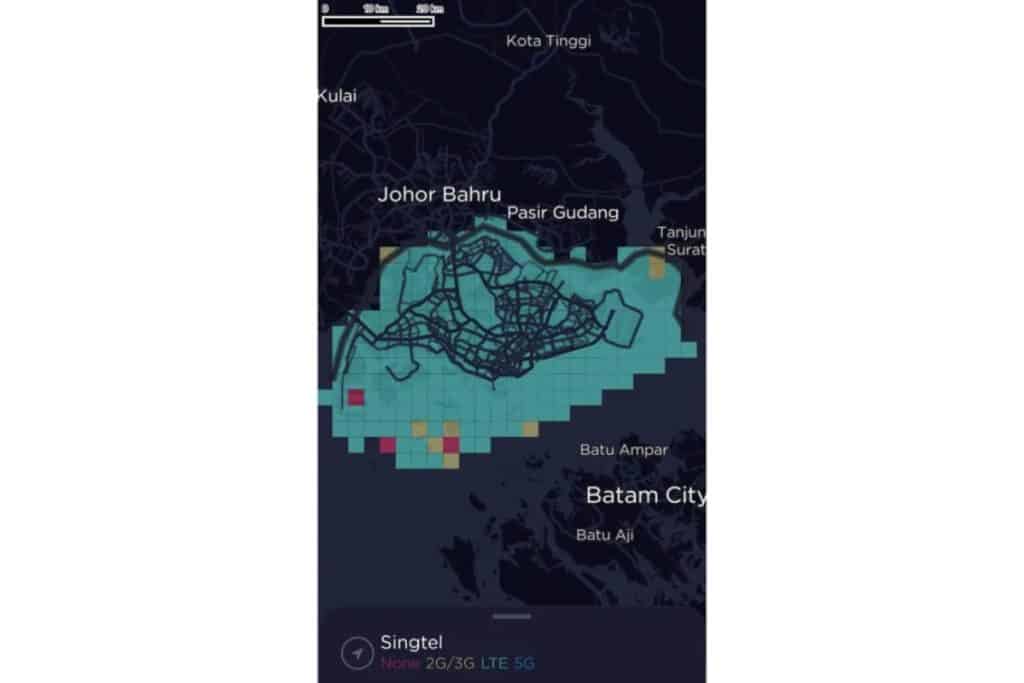
1.2. Singtel internet and frequencies
Singtel uses the following frequencies:
- 2G: N/A – shut down in 2017
- 3G: 900 MHz & 2100 MHz
- 4G/LTE: 900 MHz (Band 8), 1800 MHz (Band 3) & 2600 MHz (Band 7 & Band 38)
- 5G NR: 2100 MHz (n1) & 3500 MHz (n78)
- VoLTE: Yes
- VoWiFi: Yes
1.3. Singtel services cost that tourist show know
A Singtel SIM card, known as a hi!Card, is available for 8, 15, and 38 SGD at Singtel outlets (1/2/3). (7-Elevens or Cheers). The Changi Airport in Singapore also sells SIM cards (SIN).
| Price | SIM Card | Credit |
| 8 SGD | hi! Prepaid SIM $8 | 10 SGD (30 days) |
| 15 SGD | hi! Prepaid $15 | 15 SGD |
| 38 SGD | SG-M’Sia hi! Prepaid SIM | 38 SGD |
Tips: Short-term visitors and tourists can also get these Singtel Tourist SIM cards.
Sold for 12 SGD, 15 SGD (new), 30 SGD & 50 SGD, you will always get 100 GB of data – 100 GB is not a typo. The following four Singtel Tourist SIM cards are available:
| Price | Data | Roaming Data | Social Data 2 | Local Minutes | International Minutes | Local SMS | Validity |
| 12 SGD | 100 GB | 3 GB | “Unlimited”, 1 GB/day (7 GB) | 500 minutes | 30 minutes | 100 SMS | 7 days |
| 15 SGD | 100 GB 3 | 3 GB | “Unlimited”, 1 GB/day (7 GB) | 500 minutes | 30 minutes | 100 SMS | 28 days |
| 30 SGD | 100 GB 4 | 5 GB | “Unlimited”, 1 GB/day (12 GB) | “Unlimited”, 3000 minutes | 90 minutes | “Unlimited”, 5000 SMS | 12 days |
| 50 SGD | 120 GB 4 | 10 GB | “Unlimited”, 1 GB/day (15 GB) | “Unlimited”, 3000 minutes | 90 minutes | “Unlimited”, 5000 SMS | 15 days |
The same outlets that sell hi!Card SIM cards also offer Singtel Tourist SIM cards, albeit the 12 SGD and 15 SGD variations occasionally go “out of stock,”, especially at airports where upselling is a priority.
2. StarHub
The second-largest mobile operator in Singapore is StarHub. Although M1 Singapore frequently surpasses it in terms of subscriber count. Together with Singtel, StarHub is the finest mobile operator in the nation overall.
2.1. StarHub network coverage and quality
StarHub is one of the major mobile network operators in Singapore, with a strong network coverage that spans across the country. StarHub’s 4G network covers up to 99% of the population in Singapore, offering fast and reliable mobile data speeds for its users.
In addition to its 4G network, StarHub has also rolled out its 5G network in selected areas in Singapore. As of 2021, its 5G network covers about 70% of Singapore’s population, with plans to expand further in the coming years.
Below is StarHub’s coverage map produced by Speedtest:
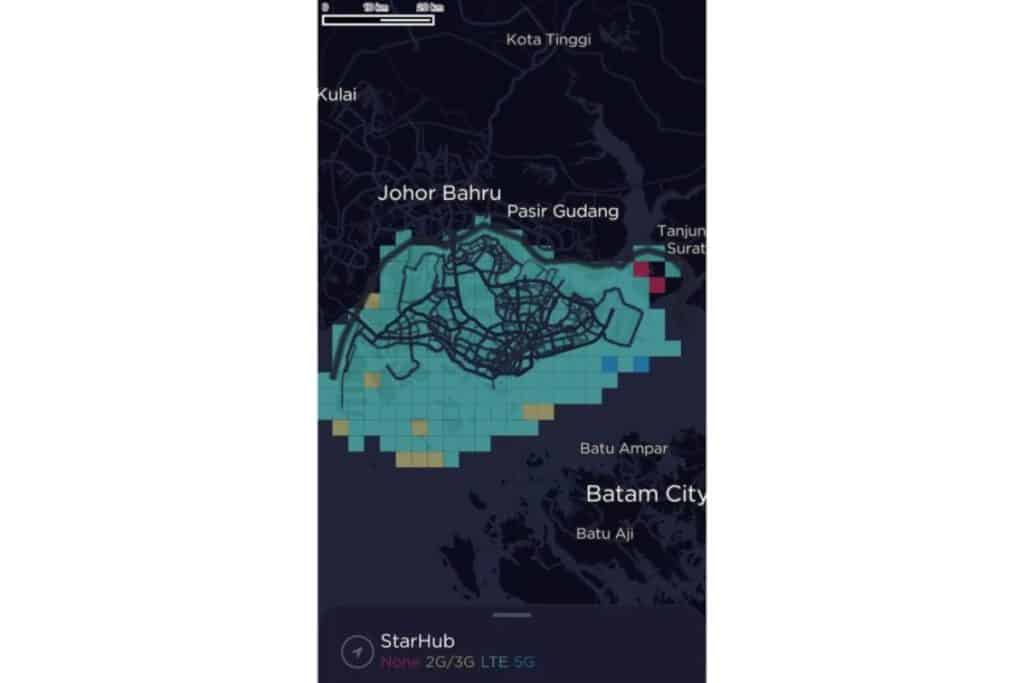
2.2. StarHub internet and frequencies
StarHub uses the following frequencies:
- 2G: N/A shut down in 2017
- 3G: 900 MHz & 2100 MHz
- 4G/LTE: 1800 MHz (Band 3), 2100 MHz (Band 1) & 2600 MHz (Band 7 & Band 38)
- 5G NR: 2100 MHz (n1) & 3500 MHz (N78) – not for prepaid (yet)
- VoLTE: Yes
- VoWiFi: Yes
2.3. StarHub services cost that tourist should know
You can get a StarHub SIM card for 8 SGD, 15 SGD, or 50 SGD in StarHub stores or convenience stores (7-Elevens or Cheers). StarHub SIM cards are also sold at Singapore Changi Airport (SIN).
The following three StarHub SIM cards are available:
| Price | Credit | Data | Social Data | Roaming Data | Local Minutes | International Minutes | Local SMS | Validity |
| 8 SGD | 8 SGD | 1 GB (30 days) | N/A | N/A | N/A | 30 minutes | N/A | 90 days |
| 15 SGD | 15 SGD | 8 GB + 120 GB (28 days) | Unlimited | N/A | 5000 minutes (28 days) | N/A | 200 SMS (28 days) | 180 days |
| 50 SGD | 50 SGD | 100 GB (10 days) | N/A | 5 GB (30 days) | N/A | N/A | N/A | 180 days |
The following two StarHub Traveler SIM cards are available:
| Price | Data | Roaming Data | Local Minutes | International Minutes | Local SMS | Validity |
| 12 SGD | 100 GB | 1 GB | 500 minutes | 30 minutes | 100 SMS | 7 days |
| 32 SGD | 100 GB | 3 GB (30 days) | 3000 minutes | 90 minutes | 5000 SMS | 12 days |
Tips: Singaporean mobile operators require your identification (passport) for eSIMs and for physical SIM cards. Therefore, if you wish to get an eSIM for Singapore (without personal detail capturing), you can get unlimited data eSIMs from SingeSIM.
3. M1 Singapore
The third-largest mobile operator in Singapore is called M1 Singapore, which is to be distinguished from the M1 financial app. Yet anytime it surpasses StarHub, it has frequently been the second-largest.
3.1. M1 network coverage and quality
M1’s 4G network covers up to 99.5% of the population in Singapore, offering fast and reliable mobile data speeds for its users.
In addition to its 4G network, M1 has launched its 5G network in selected areas in Singapore. As of 2021, M1’s 5G network covers about 50% of Singapore’s population, with plans to expand shortly.
Below is M1’s coverage map produced by Speedtest:
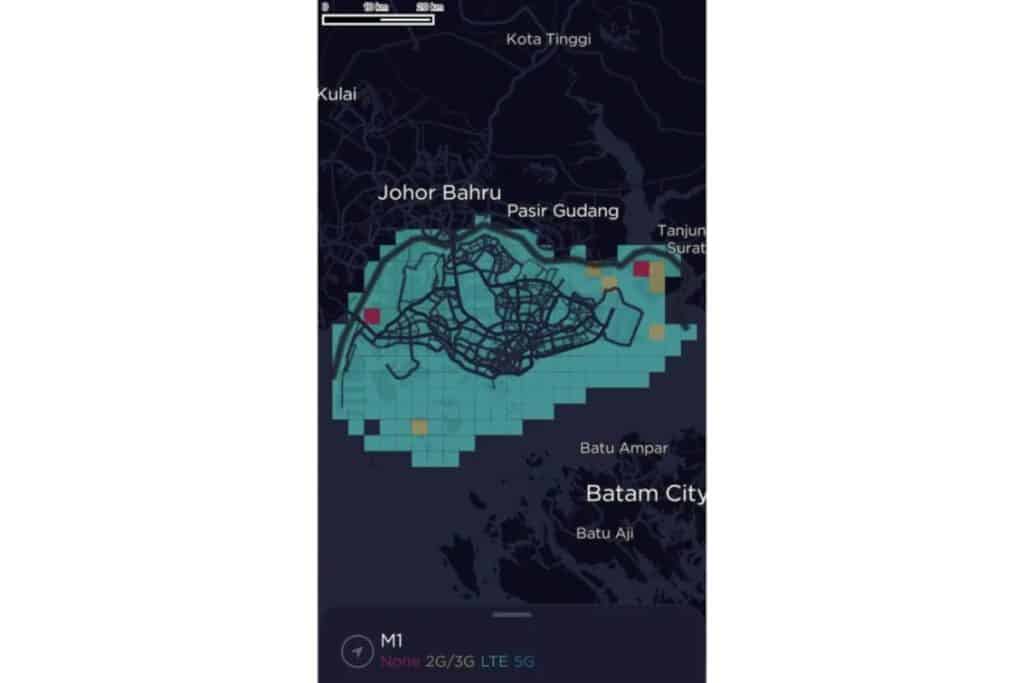
3.2. M1 internet and frequencies
M1 uses the following frequencies:
- 2G: N/A shut down in 2017
- 3G: 900 MHz & 2100 MHz
- 4G/LTE: 900 MHz (Band 8), 1800 MHz (Band 3) & 2600 MHz (Band 7)
- 5G NR: 2100 MHz (n1) & 3500 MHz (n78) – not for prepaid (yet)
3.3. M1 services costs that tourist should know
You can get an M1 SIM card, called M Card, for 14 SGD, 25 SGD & 27 SGD in M1 stores or convenience stores (7-Eleven or Cheers). M1 SIM cards are also sold at Singapore Changi Airport (SIN).
The following three M1 SIM cards are available:
| Price | Credit | Data | Local Minutes | Local SMS | Validity |
| 14 SGD | 14 SGD | 4 GB (120 days) | N/A | N/A | 180 days |
| 25 SGD | N/A | 2 GB/day (56 GB) | 5000 minutes | 1000 SMS | 28 days |
| 27 SGD | N/A | 3 GB/day (84 GB) + 16 GB | 5000 minutes | 6000 SMS | 28 days |
Short-term visitors and tourists can also get the M1Tourist SIM cards. The following four M1 Tourist SIM cards are available:
| Price | Data | Roaming Data 1 | Local Minutes | International Minutes | Local SMS | Validity |
| 12 SGD 2 | 100 GB | N/A | 500 minutes | 20 minutes | 100 SMS | 7 days |
| 14 SGD 3 | 100 GB (30 days) | Shared with data allowance | N/A | N/A | N/A | 180 days |
| 30 SGD | 100 GB | 3 GB | 3000 minutes | 50 minutes | 5000 SMS | 12 days |
| 60 SGD | 100 GB | 5 GB | 3000 minutes | 50 minutes | 5000 SMS | 14 days |
The same places that sell M Card SIM cards also offer M1 Tourist SIM cards, albeit the 12 SGD and 14 SGD varieties occasionally go “out of stock,”, especially at airports where upselling is a priority.
Tips: Note that Singaporean mobile operators require your identification (passport) for (future) eSIMs and for physical SIM cards. Therefore, if you wish to get an eSIM without personal detail capturing, you can get eSIMs from singesim.com.
3. SIMBA (formerly TPG Mobile Singapore)
SIMBA Singapore, just SIMBA and formerly TPG Mobile Singapore, is the smallest mobile operator in Singapore.
It was also the newest entrant to the Singaporean telecom market in 2020. However, SIMBA received its telecom license back in 2016. After that, it started to build its network in 2017.
SIMBA is not really interested in prepaid customers because it has literally only one prepaid plan.
3.1. SIMBA network coverage and quality
SIMBA holds full 4G and 5G spectrum rights and is committed to providing a reliable and high-quality mobile network by utilizing their in-house engineering expertise and the latest technologies.
Below is SIMBA’s coverage map produced by Speedtest:
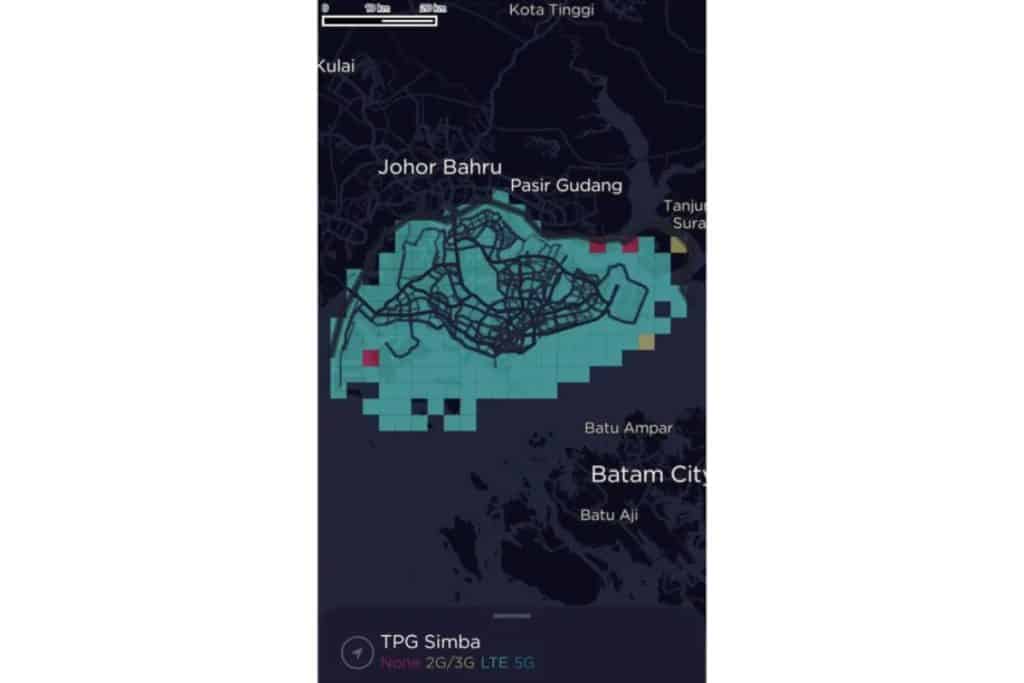
3.2. SIMBA internet and frequencies
IMBA uses the following frequencies:
- 2G: N/A – never had it
- 3G: N/A – never had it
- 4G/LTE: 900 MHz (Band 8) & 2300 MHz (Band 40)
- 5G NR: 2300 MHz (n40), 26 GHz (n258) & 28 GHz (n257) – not for prepaid customers (yet)
- VoLTE: Yes
- VoWiFi: No
3.3. SIMBA services costs that tourist should know
A SIMBA SIM card with 50 GB of data (100 GB during promotions), 1 GB of roaming data (in India, Indonesia, Japan, Malaysia, the Philippines, Taiwan, and Thailand), unlimited on-net minutes, and 30 local SMS for 30 days is available for purchase at SIMBA stores for 10 SGD. Singapore Changi Airport does not sell SIMBA SIM cards (SIN).
Note that Singaporean mobile operators require your identification (passport) for (future) eSIMs and for physical SIM cards. Therefore, if you wish to get an eSIM without personal detail capturing, you can get eSIMs from singesim.com.
V. Singapore Mobile Network Operators Comparisons
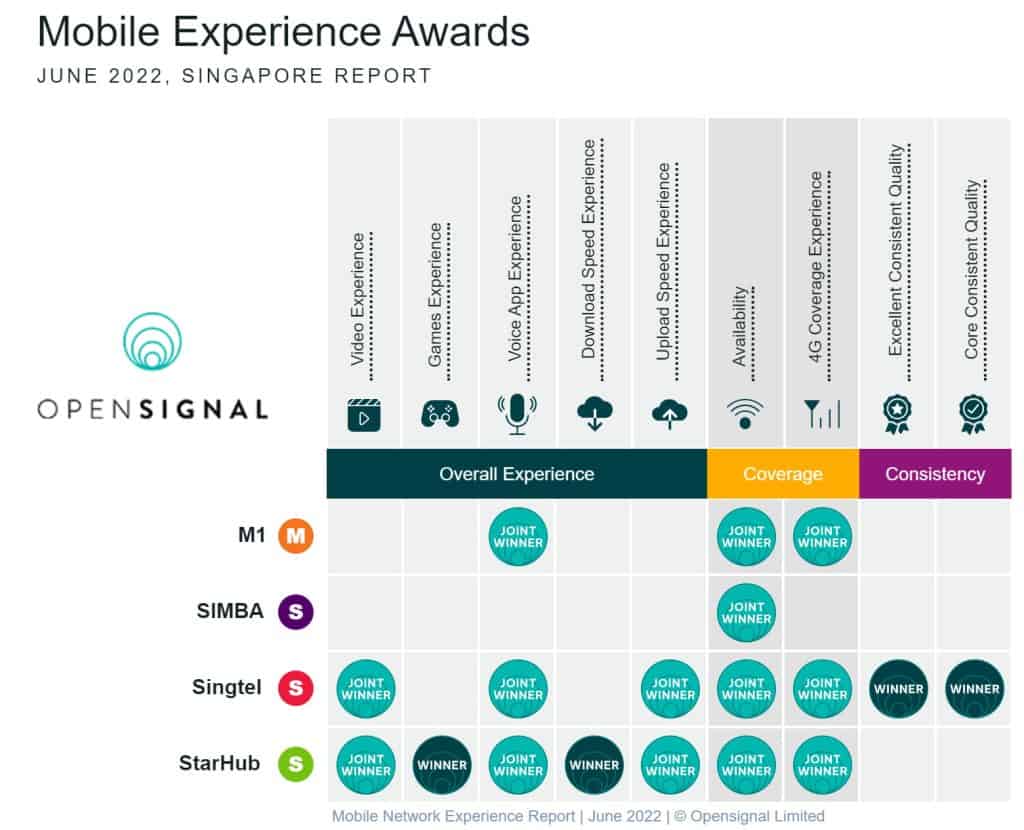
StarHub is Singapore’s top mobile network overall, according to statistics from the Opensignal study. The total experience is broken down by Opensignal into games, voice applications, download speeds, and upload speeds. Popular Singtel and other mobile service providers’ plans with at least 10GB are listed above. Here are the results for each metric for each mobile network in Singapore.
1. Video experience
The visual experience is calculated by Opensignal by streaming a variety of video resolutions up to 4K. The total score out of 100 is calculated using the following factors: picture quality, video loading speed, and stall rate. Although none of the scores are exceptionally high, Simba (TPG) behind StarHub, Singtel, and M1 by a significant margin.
- StarHub 67.1/100
- Singtel 65.5/100
- M1 62.7/100
- Simba (TPG): 48/100
2. Games experience
Multiplayer games played over mobile networks are used to determine the scores in this Opensignal category. Games include Fortnite, Prop Evolution Soccer and Arena of Valor. Latency, packet loss and jitter are all factored in to determine an overall score out of 100. It’s a close race between StarHub, Singtel and M1 but Simba (TPG) is noticeably behind.
- StarHub 81.5/100
- Singtel 78.9/100
- M1 77.7/100
- Simba (TPG): 58.4/100
3. Voice app experience
Opensignal uses communication apps like WhatsApp, Skype and Facebook Messenger to determine the scores of this category. Again, the scale is between 0 and 100, and the competition was much closer across networks with minimal difference between StarHub, Singtel, M1 and Simba (TPG).
- StarHub 80.1/100
- Singtel 79.8/100
- M1 79.7/100
- Simba (TPG): 78.2/100
4. Download speed experience
Megabits-per-second (Mbs) measurements are used by Opensignal to determine the download speeds on the different mobile networks in Singapore. Average download speeds are determined by a mix of 5G, 4G, 3G and 2G networks. As you can see below, StarHub has a noticeable lead over Singtel and M1, with Simba (TPG) lagging behind.
- StarHub 65.9Mbps
- Singtel 56.5Mbps
- M1 38.7Mbps
- Simba (TPG): 19.2Mbps
5. Upload speed experience
Upload speed isn’t as important as upload speed for most online tasks. But Opensignal uses a mix of 5G, 4G, 3G and 2G networks to determine the overall averages for the four networks in Singapore. There are only fractions of a megabit differences between Singtel, StarHub and M1, but Simba is noticeably slower.
- Singtel 14.9Mbps
- StarHub 14.5Mbps
- M1 14.2Mbps
- Simba (TPG): 4.2Mbps
6. Some key differences between the operators:
- Coverage: Singtel typically has the widest coverage, especially in rural areas. M1 is also strong in coverage. Starhub and TPG coverage depends on the network they lease.
- Plans and Rates: M1 and TPG usually offer more budget-friendly plans. Singtel and Starhub tend to have more premium plan options.
- Data Speeds: M1 is known for faster 4G and 5G data speeds, especially in downtown Singapore. Singtel and Starhub speeds are also fast but often slightly slower than M1.
- Roaming: Singtel has the best global roaming coverage. M1 and Starhub also offer roaming but typically at higher rates. TPG does not provide roaming.
- Customer Service: Singtel and Starhub tend to get higher ratings for customer service quality. M1 service is also quite good while TPG services are handled by the network provider they use.
VI. Where to Buy SIM Cards in Singapore?
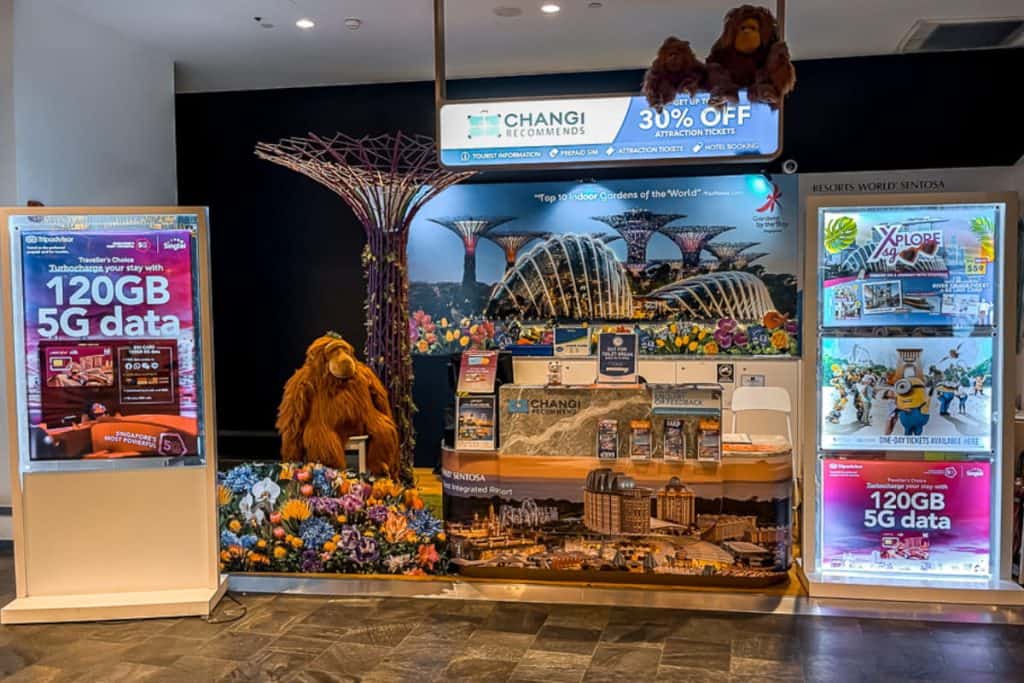
SIM cards are widely available for purchase in Singapore. You can buy them at various locations, including:
- Changi Airport: SIM cards can be purchased at Changi Airport from various telco shops or vending machines located in the Arrival Halls of all terminals. Check out how to get a SIM card in Changi Airport.
- Telco Shops: All major telcos in Singapore have their own retail shops located in various parts of the island. You can visit the telco shop to purchase a SIM card, and the staff can also assist you with setting up and activating your mobile service.
- Convenience stores: SIM cards are also available for purchase at various convenience stores, such as 7-Eleven and Cheers.
- Online: You can purchase SIM cards online from the websites of the major telcos in Singapore or through e-commerce platforms like Lazada and Shopee.
Note: It is important to note that you will need to present your passport or an international identification document and proof of address to purchase a SIM card in Singapore.
VII. Where to Get eSIM for Singapore Travel
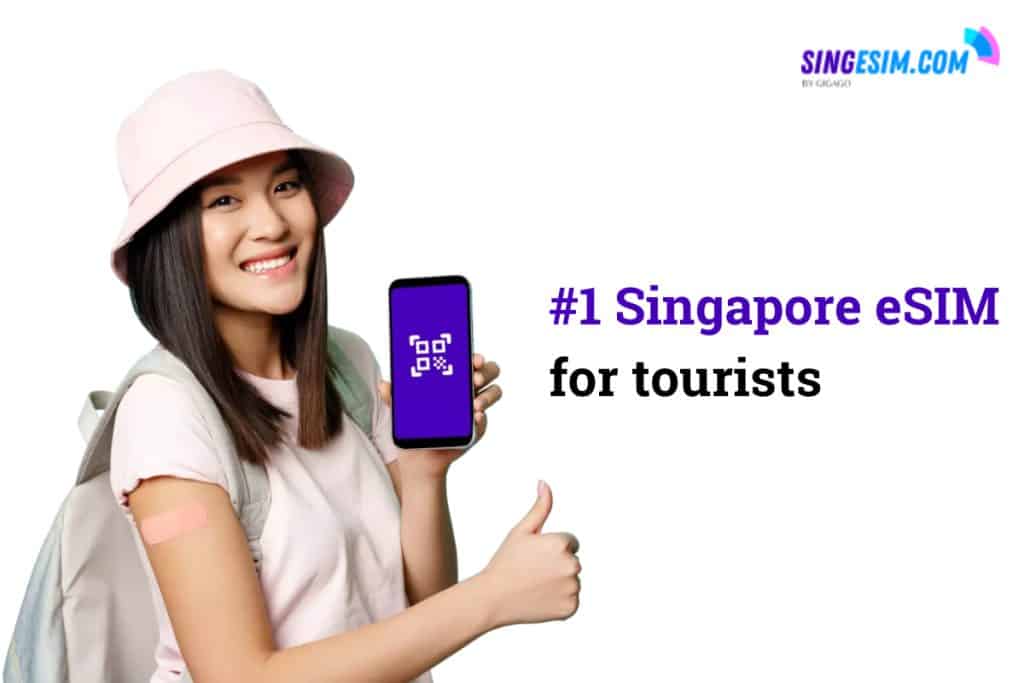
eSIMs are also available in Singapore and are a convenient option for travelers. Here are some places where you can get an eSIM for Singapore travel:
- Telco Shops: All major telcos in Singapore offer eSIMs and have their own retail shops located in various parts of the island. You can visit the telco shop to purchase an eSIM, and the staff can also assist you with the setup and activation of your mobile service.
- Changi Airport: You can also request an eSIM at Changi Airport from various telco shops or vending machines located in the Arrival Halls of all terminals. They will help you convert your SIM card to eSIM plan.
- Online: You can purchase eSIMs online from the websites of the major telcos in Singapore. You can refer to Singapore eSIM provider for various options of data plans and validity.
- SingeSIM.com: SingeSIM offer various eSIM plans for tourist visiting Singapore. You can choose from 1 day plan to 30 days plan based on your traveling plan.
Some Singapore eSIM plans for 7 days you can refer to:
Notes:
- It is important to note that not all phones support eSIMs, so you should check if your phone is compatible before purchasing an eSIM.
- Like physical SIM cards, you will need to provide your passport or an international identification document and proof of address to purchase an eSIM in Singapore.
VIII. What If Your Phone Is Network Carrier Locked?
Suppose your phone is network carrier locked when traveling in Singapore. In that case, it means that your phone can only use the services of your home carrier and is not compatible with the services of local mobile operators. In this case, you have a few options:
- Contact your home carrier: If you have a good relationship with your home carrier and have been a loyal customer for some time, you can reach out to them to request that they unlock your phone for international use. They may require you to fulfill certain criteria, such as completing your contract or paying off any outstanding fees.
- Use a roaming service: Some home carriers offer roaming services that allow you to use your phone in Singapore. However, these services can be expensive, and you may incur additional charges for data usage.
- Purchase a new phone or SIM card: If none of the above options work for you, you may need to purchase a new phone or SIM card that is compatible with local mobile operators in Singapore. This can be done at various retail stores or telco shops throughout the island.
It is important to note that unlocking your phone may void your warranty, and purchasing a new phone or SIM card can be expensive. Therefore, checking with your home carrier before traveling to Singapore is best to ensure that your phone is compatible with local mobile operators.
Besides, for those who’re using eSIM, you will need to check eSIM compatible devices list first to ensure you can properly use eSIM on your trip.
IX. FAQs about Singapore Mobile Operators
Here are some frequently asked questions about mobile operators in Singapore that a traveler may consider:
What are the major mobile operators in Singapore?
The major mobile operators in Singapore are Singtel, StarHub, and M1.
What types of mobile plans are offered by Singapore mobile operators?
Singapore mobile operators offer a variety of mobile plans, including prepaid, postpaid, and data-only plans. Some plans may include unlimited data, voice calls, and SMS, while others may have limited usage.
What should I consider when choosing a mobile operator in Singapore?
When choosing a mobile operator in Singapore, you should consider network coverage, data speeds, plan features, customer service, and pricing factors. You can also read reviews from other customers and compare plans from different operators to find the best fit for your needs.
How do I sign up for a mobile plan with a Singapore mobile operator?
You can sign up for a mobile plan with a Singapore mobile operator by visiting their website, calling their customer service hotline, or visiting one of their retail stores. You must provide some personal details and choose a plan that suits your needs and budget.
Can I use eSIM when traveling in Singapore?
Yes, you can purchase an eSIM plan from Singapore mobile operators or find an Singapore eSIM provider like SingeSIM for further eSIM plans.

